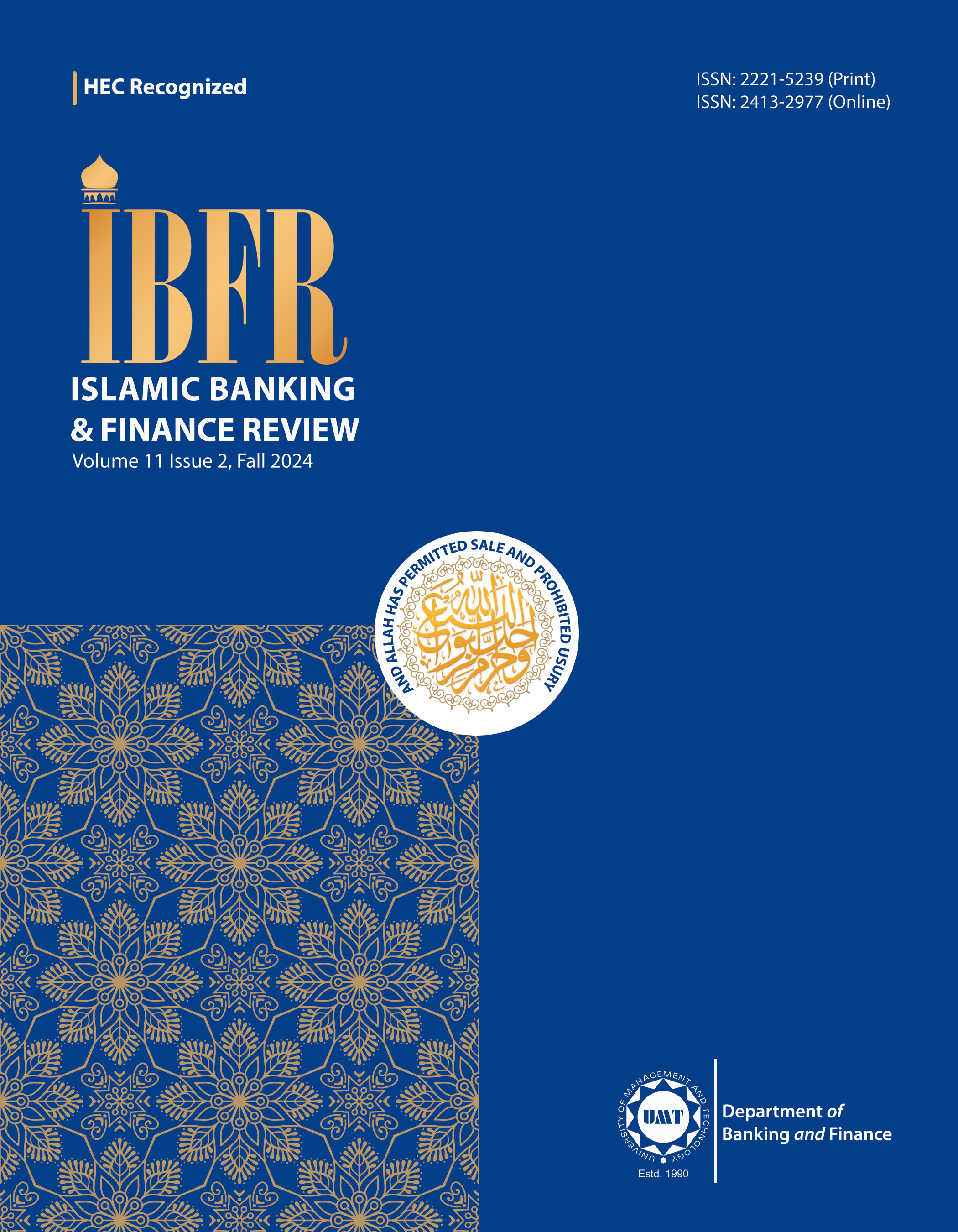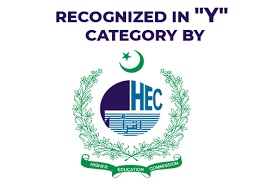The Role of Shariah-Compliant Financing and Financial Intermediation in Analyzing the Impact of Financial Inclusion on SME Growth in Balochistan, Pakistan
Abstract
 Abstract Views: 0
Abstract Views: 0
This study analyzes how SME growth is influenced by financial inclusion in Balochistan, a province of Pakistan. Furthermore, it also examines how the Shariah-compliant mode of financing and financial intermediation influences SME growth. A sample of 300 respondents was taken from three major cities in Balochistan, namely Quetta, Gwadar, and Turbat, based on judgmental sampling. Structural Equation Modelling (SEM) was employed to evaluate the direct impact of financial inclusion, Shariah-compliant financing, and financial intermediation on SME growth. As far as the direct effect of PLS-SEM is concerned, financial inclusion was found to be statistically significant to financial intermediation and two SME growth dimensions, namely profit growth and sales growth. The other two dimensions, namely market share growth and workforce growth, remain statistically insignificant. Whereas, financial intermediation is statistically significant and impacts negatively on SME growth (profit growth and sales growth) directly. In the case of indirect effect, Shariah-compliant financing was found to have a statistically negative and significant impact on financial inclusion and SME growth dimensions of profit growth and sales growth. Similarly, it was determined that financial intermediation mediates substantially and negatively impacts financial inclusion and SME growth.
Downloads
References
Ademosu, A. (2022). The impact of the financial system and its channels on SMES'access to financing: A Nigerian perspective [Doctoral dissertation, Georgia State University].ScholarWorks@Georgia State University. https://scholarworks.gsu.edu/bus_admin_diss/169/
Aduda, J., & Kalunda, E. (2012). Financial inclusion and financial sector stability with reference to Kenya: A review of literature. Journal of Applied Finance and Banking, 2(6), 95–120.
Aga, G., Francis, D., & Rodríguez-Meza, J. (2015). SMEs, age, and jobs: A review of the literature, metrics, and evidence. SSRN. https://papers.ssrn.com/sol3/papers.cfm?abstract_id=2690632
Agussalim, M., & Mappigau, P. (2013). The effect of human capital on survival of SMEs in food processing under economic crisis in Central Java, Indonesia. Proceedings of AICS-Social Sciences, 1, 189–194.
Alam, N. (2015, August 24). Islamic finance: An opportunity for SME financing. International Federation Of Accountants. https://www.ifac.org/knowledge-gateway/discussion/islamic-finance-opportunity-sme-financing
Alshardan, A., Goodwin, R., & Rampersad, G. (2016). A benefits assessment model of information systems for small organizations in developing countries. Computer and Information Science, 9(1), 1–20. http://dx.doi.org/10.5539/cis.v9n1p1
Ardic, O. P., Heimann, M., & Mylenko, N. (2011). Access to financial services and the financial inclusion agenda around the world: A cross-country analysis with a new data set. The World Bank. https://tinyurl.com/3psa9nh3
Bagozzi, R. P., & Yi, Y. (1988). On the evaluation of structural equation models. Journal of the Academy of Marketing Science, 16, 74–94. https://doi.org/10.1007/BF02723327
Bank Negara Malaysia. (2015). Changing patterns of financial intermediation and implications for central bank policy: The Malaysian perspective. SSRN. https://papers.ssrn.com/sol3/papers.cfm?abstract_id=2692756
Bongomin, G. O. C., Munene, J. C., Ntayi, J. M., & Malinga, C. A. (2018). Exploring the mediating role of social capital in the relationship between financial intermediation and financial inclusion in rural Uganda. International Journal of Social Economics, 45(5), 829–847. https://doi.org/10.1108/IJSE-08-2017-0357
Bongomin, G. O. C., Ntayi, J. M., Munene, J. C., & Malinga, C. A. (2018). Mobile money and financial inclusion in sub-Saharan Africa: The moderating role of social networks. Journal of African Business, 19(3), 361–384. https://doi.org/10.1080/15228916.2017.1416214
Brealey, R. A., Myers, S. C., & Allen, F. (2014). Principles of corporate finance. McGraw-Hill.
Chauvet, L., & Jacolin, L. (2017). Financial inclusion, bank concentration, and firm performance. World Development, 97, 1–13.
Coffie, R. B., Gyimah, R., Boateng, K. A., & Sardiya, A. (2023). Employee engagement and performance of MSMEs during COVID-19: The moderating effect of job demands and job resources. African Journal of Economic and Management Studies, 14(2), 238–251. https://doi.org/10.1108/AJEMS-04-2022-0138
Cunningham, L. X., & Rowley, C. (2008). The development of Chinese small and medium enterprises and human resource management: A review. Asia Pacific Journal of Human Resources, 46(3), 353–379. https://doi.org/10.1177/1038411108095763
Daud, M., Yussof, I. M., & Abideen, A. (2011). The establishment and operation of Islamic Banks in Nigeria: Perception study on the role of the Central Bank of Nigeria. Australian Journal of Business and Management Research, 1(2), 14–29.
Davidsson, P. (2006). Entrepreneurship and the Growth of Firms. Edward Elgar Publishing Limited.
Delmar, F., Davidsson, P., & Gartner, W. B. (2003). Arriving at the high-growth firm. Journal of Business Venturing, 18(2), 189–216.
Demirguc-Kunt, A., Klapper, L., Singer, D., Ansar, S., & Hess, J. (2018). The global findex database 2017: Measuring financial inclusion and the fintech revolution. World Bank. https://openknowledge.worldbank.org/entities/publication/ed800062-e062-5a05-acdd-90429d8a5a07
Egbetunde, T. (2012). Bank credits and rural development in Nigeria (1982-2009). International Journal of Finance and Accounting, 1(3), 45–52
Ejaz, M., & Hasan, R. (2023). Measuring financial inclusion index for developing countries. Pakistan Journal of Humanities and Social Sciences, 11(3), 3838–3852.
El-Galfy, A., & Khiyar, K. A. (2012). Islamic banking and economic growth: A review. Journal of Applied Business Research, 28(5), 943–956.
Ellis, K., & Lemma, A. (2010). Investigating the impact of access to financial services on household investment. Overseas Development Institute. https://odi.cdn.ngo/media/documents/6099.pdf
Fahmy, O. M., Rustam, M., & Asmayadi, E. (2016). The effect of inclusive finance on loans disbursed in the micro, small and medium enterprises sector in Indonesia. Jurnal Ekonomi dan Bisnis, Universitas Tanjungpura, 2, 118–135.
Fornell, C., & Larcker, D. F. (1981). Evaluating structural equation models with unobservable variables and measurement error. Journal of Marketing Research, 18(1), 39–50. https://doi.org/10.1177/002224378101800104
Ghassibe, M., Appendino, M., & Mahmoudi, S. E. (2019). SME financial inclusion for sustained growth in the Middle East and Central Asia. International Monetary Fund.
Hair, J. F. Jr, Sarstedt, M., Matthews, L. M., & Ringle, C. M. (2016). Identifying and treating unobserved heterogeneity with FIMIX-PLS: part I–method. European Business Review, 28(1), 63–76. https://doi.org/10.1108/EBR-09-2015-0094
Hair, J. F., Ringle, C. M., & Sarstedt, M. (2011). The use of partial least squares (PLS) to address marketing management topics. Journal of Marketing Theory and Practice, 19(2), 135–138.
Hair, J. F., Sarstedt, M., Ringle, C. M., & Mena, J. A. (2012). An assessment of the use of partial least squares structural equation modeling in marketing research. Journal of the Academy Of Marketing Science, 40, 414–433. https://doi.org/10.1007/s11747-011-0261-6
Herispon, H. (2017). Financial inclusion, and the role of the non-bank financial industry in the development of micro, small and medium enterprises. Eko dan Bisnis: Riau Economic and Business Review, 8(1), 70–84. https://doi.org/10.36975/jeb.v8i1.50
Iqbal, M., & Llewellyn, D. T. (Eds.). (2002). Islamic banking and finance: New perspectives on profit sharing and risk. Edward Elgar Publishing.
Ishaq, S. (2022). Small and medium enterprises'(SMEs) access to Islamic banking finance in Pakistan [Doctoral dissertation, Aston University]. Aston University, Liberary Services. https://publications.aston.ac.uk/id/eprint/44826/
Kaiser, H. F. (1974). An index of factorial simplicity. Psychometrika, 39(1), 31–36. https://doi.org/10.1007/BF02291575
Kamunge, M. S., Njeru, A., & Tirimba, O. I. (2014). Factors affecting the performance of small and micro enterprises in Limuru Town Market of Kiambu County, Kenya. International Journal of Scientific and Research Publications, 4(12), 1–20.
Kendall, J., Mylenko, N., & Ponce, A. (2010). Measuring financial access around the world. SSRN. https://papers.ssrn.com/sol3/papers.cfm?abstract_id=1585032
Kenya Bankers Association. (2022). Kenya bankers association annual report and financial statements 2021. http://www.parliament.go.ke/sites/default/files/2022-11/Annual%20Report%20and%20Financial%20Statements%20on%20Kenya%20Bankers%20Association%20the%20FY%202021-2022.pdf
Khalatur, S., Tvaronavičienė, M., Dovhal, O., Levkovich, O., & Vodolazska, O. (2022). Impact of selected factors on digitalization of financial sector. Entrepreneurship and Sustainability Issues, 10(1), 358–377. https://doi.org/10.9770/jesi.2022.10.1(19)
Khan, C., Raheman, A., & Farooq, I. (2024). Effect of financial inclusion on growth of small and medium enterprises in Pakistan through moderating effect of shariah-compliant financing. Bahria University Journal of Management & Technology, 7(1), 00–00. https://doi.org/10.62533/bjmt.v7i1.91
Kieschnick, R., Laplante, M., & Moussawi, R. (2013). Working capital management and shareholders’ wealth. Review of Finance, 17(5), 1827–1852. https://doi.org/10.1093/rof/rfs043
Kumar, C., & Mishra, S. (2010). Banking outreach and household level access: Analyzing financial inclusion in India. Policy Commons. https://policycommons.net/artifacts/2211523/banking-outreach-and-household-level-access/2968467/
Lee, C. C., Wang, C. W., & Ho, S. J. (2020). Financial inclusion, financial innovation, and firms’ sales growth. International Review of Economics & Finance, 66, 189–205. https://doi.org/10.1016/j.iref.2019.11.021
Martinez, M. V. (2011). The political economy of increased financial access [Doctoral dissertation, Georgetown University]. Digital Georgetown University. https://repository.library.georgetown.edu/handle/10822/553824
Mehrotra, A. N., & Yetman, J. (2015). Financial inclusion-issues for central banks. SSRN. https://papers.ssrn.com/sol3/papers.cfm?abstract_id=2580310
Mishkin, F. S. (2007). Is financial globalization beneficial? Journal of Money, Credit and Banking, 39(2‐3), 259–294. https://doi.org/10.1111/j.0022-2879.2007.00026.x
Mohieldin, M., Iqbal, Z., Rostom, A., & Fu, X. (2015). The role of Islamic finance in enhancing financial inclusion in Organization of Islamic Cooperation (OIC) countries. Islamic Economic Studies, 20(2), 55–120.
Montiel, P. J. (2003). Macroeconomics in emerging markets. Cambridge University Press.
Muneer, S., & Ahmad, R. A. (2017). Impact of financing on small and medium enterprises (SMEs) profitability with moderating role of Islamic finance. Information Management and Business Review, 9(2), 25–32. https://doi.org/10.22610/imbr.v9i2.1720
Mustafa, D., Baita, A. J., & Usman, A. Y. (2018). Impact analysis of Islamic finance on financial inclusion and economic growth in selected Muslim countries: Lessons for Nigeria. International Journal of Economics, Management and Accounting, 26(2), 393–414. https://doi.org/10.31436/ijema.v26i2.512
Nanziri, L. E. (2020). Women, inclusive finance and the quality of life: Evidence from Zambia. In M. Konte & N. Tirivayi (Eds.), Women and sustainable human development: Empowering women in Africa (pp. 285–303). Springer.
Okafor, F. O. (2012). Financial inclusion: An instrument for economic growth and balanced development in rural areas. Journal of the Chartered Institute of Bankers of Nigeria, 6(8), 38–45.
Okafor, I., Ugwuegbe, S. U., & Chijindu, E. H. (2016). Impact of small and medium-sized enterprise on the growth of the Nigerian economy. International Journal of Economies, Commerce and Management, 4(6), 678–692.
Omar, M. A., & Inaba, K. (2020). Does financial inclusion reduce poverty and income inequality in developing countries? A panel data analysis. Journal of Economic Structures, 9(1), Article e37. https://doi.org/10.1186/s40008-020-00214-4
Onaolapo, A. A., & Oladejo, M. O. (2011). Effectiveness of millennium development goal programmes on entrepreneurial development: An appraisal of the Nigerian experience. Journal of Emerging Trends in Economics and Management Sciences, 2(4), 310–319.
Onaolapo, A. R. (2015). Effects of financial inclusion on the economic growth of Nigeria (1982-2012). International Journal of Business and Management Review, 3(8), 11–28.
Oshora, B., Desalegn, G., Gorgenyi-Hegyes, E., Fekete-Farkas, M., & Zeman, Z. (2021). Determinants of financial inclusion in small and medium enterprises: Evidence from Ethiopia. Journal of Risk and Financial Management, 14(7), Article e286. https://doi.org/10.3390/jrfm14070286
Raheman, A., Afza, T., Qayyum, A., & Bodla, M. A. (2010). Working capital management and corporate performance of manufacturing sector in Pakistan. International Research Journal of Finance and Economics, 47(1), 156–169.
Rasheed, R., & Siddiqui, S. H. (2019). Attitude for inclusive finance: influence of owner-managers and firms’ characteristics on SMEs financial decision making. Journal of Economic and Administrative Sciences, 35(3), 158–171. https://doi.org/10.1108/JEAS-05-2018-0057
Ratnawati, K. (2020). The impact of financial inclusion on economic growth, poverty, income inequality, and financial stability in Asia. The Journal of Asian Finance, Economics and Business, 7(10), 73–85.
Raza, H., Ahmed, F., Osama, A., & Ahmed, F. (2017). Islamic banking for small and medium enterprises (SMEs): A glance at challenges and prospects in Pakistan. International Journal of Development and Sustainability, 6(12), 1998–2008.
Rokhayati, I. (2015). Performance measurement in micro, small and medium enterprises (MSMEs): a literature review. Monex: Journal Research Accounting Politechnic Tegal, 4(2), 94–100.
Sarwar, M. A., & Khattak, A. N. (2024). Aspects and dimensions of organizational performance: A qualitative-exploratory literature review. Journal of Development and Social Sciences, 5(3), 587–595. https://doi.org/10.47205/jdss.2024(5-III)52
State Bank of Pakistan. (2022). SME financing data tables. https://www.sbp.org.pk/sme/PDF/DFG/2022/Dec.pdf
Turyakira, P., & Mbidde, C. I. (2015). Networking for SMES in Uganda: A conceptual paper. African Journal of Business Management, 9(2), 43–49.
Usmani, M. T. (2002). An introduction to Islamic finance (Vol. 20). Brill.
World Bank. (2014). Global financial development report 2014: Financial inclusion. https://documents.worldbank.org/en/publication/documents-reports/documentdetail/225251468330270218/global-financial-development-report-2014-financial-inclusion
Copyright (c) 2024 Chakar

This work is licensed under a Creative Commons Attribution 4.0 International License.
Authors retain copyright and grant the journal right of first publication with the work simultaneously licensed under a Creative Commons Attribution (CC-BY) 4.0 License that allows others to share the work with an acknowledgement of the work’s authorship and initial publication in this journal.












